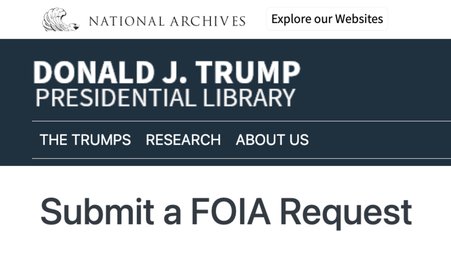Dear Friend of Press Freedom,
I’m Lauren Harper, the first Daniel Ellsberg chair on government secrecy at Freedom of the Press Foundation (FPF), and welcome to “The Classifieds.” Read on to learn how a deadly E. coli outbreak was kept secret, calling Robert F. Kennedy Jr.’s commitment to “total transparency” into further doubt, and more of this week’s top secrecy news stories.
FDA hides deadly lettuce information
A recent NBC News report that the Food and Drug Administration hid information related to a deadly E. coli outbreak undermines Health and Human Services Secretary Robert F. Kennedy Jr.’s claims of “total transparency.”
The outbreak, caused by contaminated romaine lettuce, made dozens of people sick — landing a nine-year-old boy in the hospital and killing a 57-year-old woman in Missouri. But as NBC News reporter Suzy Khimm notes, “chances are you haven’t heard about it” because the FDA closed the investigation in February without telling the public what happened. (This silence appears to have occurred while the FDA was under a gag order mandated by President Donald Trump to not communicate with the public.)
An internal FDA report obtained through a Freedom of Information Act request about the outbreak also hides the names of the companies it investigated, ostensibly “because no contaminated lettuce was left by the time investigators uncovered where the pathogen was coming from.”
The internal report contains markers indicating that the withholdings were made to protect "trade secrets and commercial or financial information” — which apparently take precedence over public health concerns.
RFK Jr. promises expansive FOIA library
The Daily Caller’s Emily Kopp recently asked RFK Jr. when HHS FOIA offices were going to be restored. Earlier this month the entire FOIA office at the Centers for Disease Control and Prevention was placed on administrative leave, and most FOIA staff at the FDA and the National Institutes of Health were also let go.
Kennedy responded that the FOIA offices were going to be restored, although it’s unclear if this means the individual CDC FOIA office will be restaffed, or if a central FOIA hub will be built to handle all HHS FOIAs.
The secretary also hinted that the new FOIA office(s) will include an expansive FOIA library “with all former FOIA requests and the documents that were produced so people don’t have to do it again and again. We’re going to try to get as close as we can to total transparency in this agency.”
Agencies are required to host electronic FOIA libraries (often called electronic reading rooms) on their websites that should contain frequently requested records, as well as agency FOIA regulations and annual reports. Most agency libraries are sparse, rarely updated, and — even if they contain a smattering of FOIA releases — do not contain the FOIA requests themselves.
What I’m reading
Director of National Intelligence Tulsi Gabbard visits National Archives to announce release of Senator Robert F. Kennedy assassination records (National Archives and Records Administration). A National Archives press release announcing the declassification of 10,000 pages of RFK assassination records contained a strange detail — NARA’s “announcement was made exclusively to The Daily Wire’s White House Correspondent Mary Margaret Olohan.” It’s unclear why the ostensibly public announcement would need to be a scoop for any news agency, much less The Daily Wire.
The Washington Post reports that another 50,000 pages of additional RFK records were found during the declassification effort. They had apparently been lost in CIA and FBI warehouses and never been turned over to NARA. These will also be processed for declassification.
The FBI can't find ‘missing’ records of its hacking tools (404 Media). It seems like the FBI loses a lot of records. Jason Cox reports that the FBI can’t “find records related to its purchase of a series of hacking tools, despite spending hundreds of thousands of dollars on them and those purchases initially being included in a public U.S. government procurement database before being quietly scrubbed from the internet.”
‘Signal-gate’ shines spotlight on Rubio role as acting Archivist (Federal News Network). I recently spoke with FNN’s Justin Doubleday about how the Signalgate fiasco highlights Marco Rubio’s conflict of interest serving as both the secretary of state and acting archivist. The University of Maryland’s Jason Baron adds, “There’s little evidence to date that acting Archivist Marco Rubio understands the scope of his duties in enforcing the records laws.”
Thanks for reading, and see you next time.
Transparently yours,
Lauren Harper
Daniel Ellsberg Chair on Government Secrecy
Freedom of the Press Foundation





